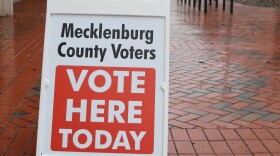Candidate filing begins next week in North Carolina for next year’s election. Dozens of candidates have already announced plans to run, with some of the largest numbers on the Republican side. So why are primaries for less prominent races like lieutenant governor drawing so many contenders?
Only two Democrats — state Sen. Rachel Hunt and former Sen. Ben Clark — are running for lieutenant governor so far, but at least nine Republicans have announced campaigns for an office that often gets little attention. The best-known contenders include N.C. Rep. Jeffrey Elmore, R-Wilkes, former N.C. Sen. Deanna Ballard, R-Watauga, Montgomery County pastor Allen Mashburn, Rockingham County Sheriff Sam Page and Hal Weatherman, who served as a top aide to former Lt. Gov. Dan Forest. The list also includes Rockingham County attorney Seth Woodall, Rivera Douthit, Marlenis Hernandez Novoa and Peter Boykin.
Political observers say there’s no clear frontrunner, so voters will find it challenging to sort through the list on their ballots.
Why so many are vying for a position with little power
Some are surprised to see so much interest in a role that has little power. North Carolina’s lieutenant governor holds a few seats on state boards and presides over Senate sessions, but has no policymaking role in the legislature.
Anna Beavon Gravely, who analyzes state elections as executive director of the N.C. Free Enterprise Foundation, said that’s part of the appeal.
"There's less of a definition of what that role is," she said. "And so, there's a little more opportunity for you, as a sitting lieutenant governor, to create a name for yourself and define what it looks like. And so, I think the creativity and the opportunity with that role in particular is really enticing."
It could also draw candidates who have their eye on a higher office.
"The only thing I can figure is there's a big appetite amongst politicos to get in the wait-and-see-if-the-governor-dies seat, which is basically the main function of the lieutenant governor these days," said Jim Blaine, a Republican political consultant with the firm The Differentiators.
Blaine said there’s not much difference between the candidates on big issues like abortion or taxes.
"A lot of times, the way candidates differentiate themselves these days is not through their policy positions, which historically has been how candidates define themselves, but through their personalities, through gimmicks and attention-getting stunts," he said.
The crowded field for lieutenant governor and several congressional seats will likely bring some eye-catching ads in the coming months.
"Some people blow up things, some people shoot things — I mean, there's a whole variety, there's a whole genre of attention-getting ads," Blaine said. "I personally think humor is probably one of the better ways to do it."
Greg Gebhardt ran for lieutenant governor in 2020, facing eight opponents in the Republican primary. He made stops at small local airports a hallmark of his campaign.
"A dear friend of mine owns a private aircraft and he donated the use of that aircraft in my campaign," Gebhardt said. "And so, with our aviation history, First in Flight North Carolina, I tried to make that a unique thing."
He said a crowded field of candidates can push GOP candidates further to the right on major issues.
"It really is, who can be the loudest and get the most attention, because again, you're fighting for those eyeballs, and you're fighting for that name ID," Gebhardt said. "And so, it probably leads folks to stake themselves further out than they might otherwise stake themselves out."
Another way candidates can get an edge is by spending their own money on the race. One of the lieutenant governor candidates, Seth Woodall, said he'll spend a million dollars in the primary. Gravely said that strategy can make a difference.
"I think if you start that way, and you stay that way, that is not going to be helpful for you," she said. "If you start that way, just to put a little juice behind your campaign, and then you gain other individual donors, that's going to be much more beneficial for you."
Another key factor could be endorsements, and so far, no heavy hitters have weighed in on the lieutenant governor primary, Gebhardt notes.
"Let's just be honest, the two endorsements that I think mean the most right now in the Republican Party in North Carolina, are former President Donald Trump, and the current Lt. Gov. Mark Robinson," he said.
Robinson hasn't weighed in on the race, and Senate leader Phil Berger said he doesn't plan to endorse anyone until the primary is over.
Connecting with voters in person can go a long way
Candidates for lieutenant governor and other statewide races are frequently visiting county-level party organizations, and their social media feeds are filled with photos posing with local party leaders.
Republican candidate for Lt Governor Hal Weatherman made his fourth visit of the campaign to Ashe County last night. Always good to be in West Jefferson, NC. pic.twitter.com/0hvjBhW5Ql
— Hal Weatherman (@HalWeathermanNC) November 22, 2023
Gravely said that personal touch can make a difference.
"North Carolina is getting more and more specific about how they're connecting with candidates," she said. "And so being able to meet them, I think does carry weight, being able to hear them in person carries weight."
Some campaigns have pledged to visit all 100 counties, but Gebhardt wonders if he spent too much time at small GOP gatherings during his 2020 race.
"If you went and talked to all 300 of those clubs, right, like what percentage of the GOP primary voter do they actually make up?" he said. "And I would submit to you it's a small percentage when you compare it to the overall turnout of folks who are going to pull a Republican ballot."
Gebhardt said he wishes he had devoted more resources to greeting voters at polling sites, where they often arrived undecided on down-ballot races.
NC lieutenant governor isn't the only crowded race in 2024
While the Republican primary for lieutenant governor has the most candidates so far, it’s not the only crowded primary next year.
In the 13th congressional district around the Triangle, at least eight Republicans are vying for a chance to replace Democratic Congressman Wiley Nickel. Nickel’s previously competitive district has been redrawn to lean Republican. With N.C. Rep. Erin Paré's announcement this week that she's dropping out to run for re-election to the House, there's no clear frontrunner in that primary.

The remaining candidates include DeVan Barbour of Johnston County, who came in second place in the 2022 primary for the district, former legislative candidate and businessman Fred Von Canon, and first-time candidates including Kenny Xu, Siddhanth Sharma, Brad Knott, Matt Shoemaker, Eric Stevenson and Josh McConkey.
And six Republicans so far are running for state auditor after Democrat Beth Wood announced plans to step down. Former N.C. Sen. Jeff Tarte, R-Mecklenburg, entered that race this week.
Meanwhile on the Democratic side, the most crowded primary is for attorney general, where four candidates are running. Other Democratic primaries have no more than two candidates so far.
Blaine said the number of candidates for statewide and congressional races so far isn’t that unusual.
"It always feels like there are a lot of candidates running," he said. "But if you go back and look at the 2022 congressional cycle, and at the 2020 statewide Council of State cycle, I think we're pretty much in line, maybe a little bit down."
And there’s still plenty of time for other candidates to jump in. The filing period ends on Dec. 15.








